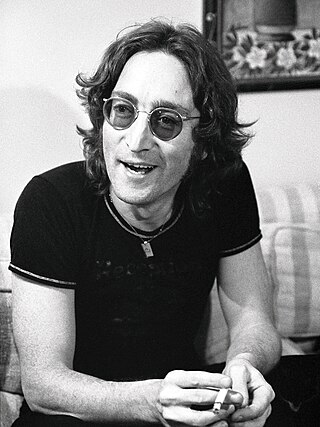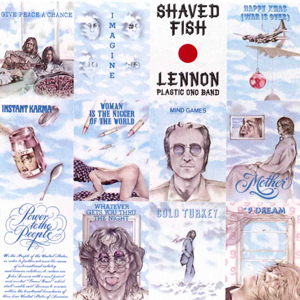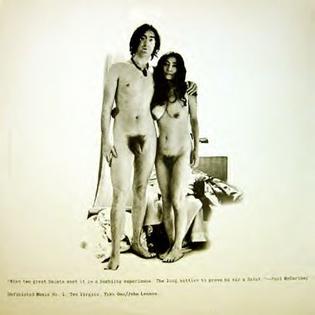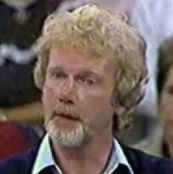
John Winston Ono Lennon was an English singer, songwriter and musician who gained worldwide fame as the founder, co-songwriter, co-lead vocalist and rhythm guitarist of the Beatles. His work included music, writing, drawings and film. His songwriting partnership with Paul McCartney remains the most successful in history.

Yoko Ono is a Japanese multimedia artist, singer, songwriter, and peace activist. Her work also encompasses performance art and filmmaking.

Klaus Otto Wilhelm Voormann is a German artist, musician, and record producer.
Apple Records is a British record label founded by the Beatles in 1968 as a division of Apple Corps Ltd. It was initially intended as a creative outlet for the Beatles, both as a group and individually, plus a selection of other artists including Mary Hopkin, James Taylor, Badfinger and Billy Preston. In practice, the roster had become dominated by the mid-1970s with releases of the former Beatles as solo artists. Allen Klein managed the label from 1969 to 1973, then it was managed by Neil Aspinall on behalf of the Beatles and their heirs. Aspinall retired in 2007 and was replaced by Jeff Jones.

Mind Games is the fourth solo studio album by English musician John Lennon. It was recorded at Record Plant Studios in New York in summer 1973. The album was released in the US on 29 October 1973 and in the UK on 16 November 1973. It was Lennon's first self-produced recording without help from Phil Spector. Like his previous album, the politically topical and somewhat abrasive Some Time in New York City, Mind Games received mixed reviews upon release. It reached number 13 in the UK and number 9 in the US, where it was certified gold.

Shaved Fish is a compilation album by English rock musician John Lennon with the Plastic Ono Band, issued in October 1975 on Apple Records. It contains all of the singles that he had issued up to that point in the United States as a solo artist, with the exception of "Stand by Me", which had been released earlier that year. The only compilation of Lennon's non-Beatles recordings released during his lifetime, the album peaked at number 8 in the UK and number 12 in the US. It was also Lennon's final album released on Apple Records before it was shut down in 1975, to be revived in the 1990s.

Apple Corps Limited is a multi-armed multimedia corporation founded in London in January 1968 by the members of The Beatles to replace their earlier company and to form a conglomerate. The name is a pun for its pronunciation "apple core". Its chief division is Apple Records, which was launched in the same year. Other divisions included Apple Electronics, Apple Films, Apple Publishing and Apple Retail, whose most notable venture was the short-lived Apple Boutique, on the corner of Baker Street and Paddington Street in central London. Apple's headquarters in the late 1960s was at the upper floors of 94 Baker Street, after that at 95 Wigmore Street, and subsequently at 3 Savile Row. The last of these addresses was also known as the Apple Building, which was home to the Apple studio.

Live Peace in Toronto 1969 is a live album by the Plastic Ono Band, released in December 1969 on Apple Records. Recorded at the Toronto Rock and Roll Revival festival, it was the first live album released by any member of the Beatles separately or together. John Lennon and his wife Yoko Ono received a phone call from the festival's promoters John Brower and Kenny Walker, and then assembled a band on very short notice for the festival, which was due to start the following day. The band included Eric Clapton, Klaus Voormann, and drummer Alan White. The group flew from London, and had brief unamplified rehearsals on the plane before appearing on the stage to perform several songs; one of which, "Cold Turkey", was first performed live at the festival. After returning home, Lennon mixed the album in a day.

Unfinished Music No. 2: Life with the Lions is the second of three experimental albums of avant-garde music by John Lennon and Yoko Ono, released in May 1969 on Zapple, a sub label of Apple. It was a successor to 1968's highly controversial Unfinished Music No. 1: Two Virgins, and was followed by the Wedding Album. The album peaked in the United States at number 174, 50 places lower than the previous album. The album, whose title is a play on words of the BBC Radio show Life with The Lyons, was recorded at Queen Charlotte's Hospital in London and live at Cambridge University, in November 1968 and March 1969, respectively. The Cambridge performance, to which Ono had been invited and to which she brought Lennon, was Lennon and Ono's second as a couple. A few of the album's tracks were previewed by the public, thanks to Aspen magazine. The album was remastered in 1997.

Unfinished Music No. 1: Two Virgins is the first of three experimental albums released by John Lennon and Yoko Ono on Apple Records. It was the result of an all-night session of musical experimentation with Yoko in John's home studio at Kenwood, while his wife, Cynthia Lennon, was on holiday in Greece. Lennon and Ono's 1968 debut recording is known not only for its avant-garde content, but also for its cover, which shows the couple naked. This made the album controversial to both the public and the parent record company EMI, which refused to distribute it. In an attempt to avoid controversy, the LP record was sold in a brown paper bag, and distributed by Track and Tetragrammaton in the United Kingdom and the United States respectively. Two Virgins, while failing to chart in the UK, reached number 124 in the US. The album was followed six months later by Unfinished Music No. 2: Life with the Lions.

May Fung Yee Pang is an American former music executive. She worked for John Lennon and Yoko Ono as a personal assistant and production coordinator. When Lennon and Ono separated in 1973, Pang and Lennon began a relationship that lasted more than 18 months. Lennon later referred to this time as his "Lost Weekend". Pang published two books about her relationship with Lennon; a memoir, Loving John, and a book of photographs, Instamatic Karma. A documentary about their relationship, The Lost Weekend: A Love Story, was produced in 2022.

Robert Fraser, sometimes known as "Groovy Bob", was a London art dealer. He was a figure in the London cultural scene of the mid-to-late 1960s, and was close to members of the Beatles and the Rolling Stones. In February 2015, the exhibition A Strong Sweet Smell of Incense: A Portrait of Robert Fraser, curated by Brian Clarke, was presented by Pace Gallery at the Royal Academy of Arts in London.

The Plastic Ono Band was a rock band formed by John Lennon and Yoko Ono in 1969 for their collaborative and solo projects based on their 1968 Fluxus conceptual art project of the same name.

"Instant Karma!" is a song by English rock musician John Lennon, released as a single on Apple Records in February 1970. The lyrics focus on a concept in which the consequences of one's actions are immediate rather than borne out over a lifetime. The single was credited to "Lennon/Ono with the Plastic Ono Band", apart from in the US, where the credit was "John Ono Lennon". The song reached the top five in the British and American charts, competing with the Beatles' "Let It Be" in the US, where it became the first solo single by a member of the band to sell a million copies.
Kenwood is a house on the St George's Hill estate, Weybridge, Surrey, England. Originally called the Brown House, it was designed by architect T. A. Allen, and built in 1913 by Love & Sons, a local building firm. The estate was constructed around the Weybridge Golf Club, which was designed in 1912 by Harry Colt.

Peter Shotton was an English businessman. He was known for creating the Fatty Arbuckle's chain of restaurants and for his long friendship with John Lennon of the Beatles; he played the washboard in the Beatles' precursor the Quarrymen and remained close to the band, holding various positions related to their business ventures over the years.
The Beatles were an English rock band, active from 1960 until 1970. From 1962 onwards, the band's members were John Lennon, Paul McCartney, George Harrison and Ringo Starr. Their break-up is attributed to numerous factors, including: the strain of the Beatlemania phenomenon, the 1967 death of manager Brian Epstein, bandmates' resentment of McCartney's perceived domineering, Lennon's heroin use and his relationship with Yoko Ono, Harrison's increasingly prolific songwriting, the floundering of Apple Corps, the Get Back project, and managerial disputes.
Lennon Naked is a 2010 television biographical film focusing on the life of John Lennon between 1967 and 1971. It stars Christopher Eccleston as John Lennon and was directed by Edmund Coulthard.

Half-A-Room is a 1967 conceptual artwork by the Japanese artist Yoko Ono.
Self-Portrait was a 1969 film made by the artist Yoko Ono. Premiering at the Institute of Contemporary Arts in London in 1969, the 42 minute film consisted of a single shot of her husband John Lennon's semi-erect penis.













